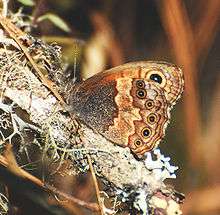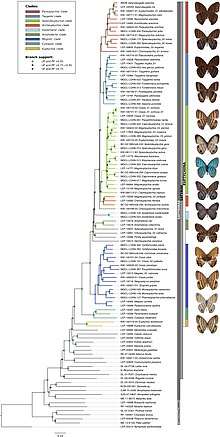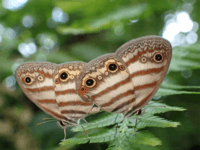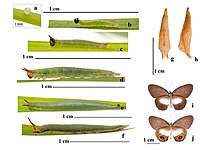Euptychiina
The butterfly subtribe Euptychiina (Lepidoptera: Nymphalidae) is a diverse group within the tribe Satyrini, occurring throughout Central and South America, in addition to a few species known from North America. Euptychiina is a predominantly lowland group, with the exception of one Asian taxon Palaeonympha opalina Butler, 1871 and the Andean genus Forsterinaria Gray, 1973. The taxon was erected by Lee Denmar Miller.[1][2]
| Euptychiina | |
|---|---|
 | |
| Arizona pine satyr (Paramacera allyni) | |
| Scientific classification | |
| Kingdom: | Animalia |
| Phylum: | Arthropoda |
| Class: | Insecta |
| Order: | Lepidoptera |
| Family: | Nymphalidae |
| Tribe: | Satyrini |
| Subtribe: | Euptychiina L. D. Miller |
| Genera | |
|
About 50 | |
Euptychiina
Despite its members being common, this subtribe has been a challenging subject for taxonomic and phylogenetic studies for many years because of their dull coloration, intraspecific variation, lack of clear morphological characters, and morphological homogeneity.[2] However, with the exception of pioneering work by W. Forster[3] and L. D. Miller,[4] the group received little attention from butterfly researchers until recently due to their typically dull brownish coloration. Currently, 50 genera and over 400 described species are recognized within this subtribe,[5][6] but the group is estimated to contain over 500 species in 70 genera.[6] The current classification of Euptychiina is based on the Lamas checklist,[7] who retained and reorganized many of the genera erected by Forster. Forster described 33 euptychiine genera that are now widely accepted, but since he erected these genera without testing monophyly and synapomorphies, many of his genera have been recovered as polyphyletic or paraphyletic in recent molecular phylogenetic studies.[1][8]

History of classification
A. Butler[9] was probably the first to propose a systematic classification for many euptychiine taxa, excluding species now in the "Taygetis clade". In his monograph of Euptychia (then used as a catch-all genus to include most euptychiine species), Butler divided the genus into seven groups (Division I to VII). Subsequently, Butler proposed an updated classification for the group and recognized 27 "species groups" within Euptychia sensu Butler (1867).[10] G. Weymer recognized 29 "species group" within Euptychia sensu Butler, in addition to treating Taygetis and Amphidecta in his monograph of Satyridae in the "Macrolepidoptera of the American Faunistic region" by A. Seitz.[11] Based on Weymer (1911)'s classification, Forster (1964) introduced 33 euptychiine genera and his classification is largely retained in Lamas (2004), a work considered as a vital foundation regarding Neotropical butterfly classification.[3][7] The recent years have seen an explosion of interest in euptychiine systematics, resulting in many changes in generic classification of the group as well as improvement in our understanding of its species diversity.[6][12] Although the subtribal name was first introduced by L. D. Miller when he treated Euptychiina as a tribal level taxon "Euptychiini",[4] the genus Euptychia Hübner, 1818 was historically used to place many euptychiine species now no longer classified in that genus, perhaps explaining why the generic name Euptychia was used in a much broader sense to include many other euptychiine species. Consequently, Forster included this name "Euptychia" as part of new generic names he described, a trend also followed when the new generic name Atlanteuptychia was introduced for Euptychia ernestina Weymer, 1911.[13] However, other recently described euptychiine genera do not follow this trend (references above).
Biology
There exist detailed early stage biology (i.e. complete life cycle documented) information for 30 euptychiine species.[14][15][16][17][18][19] Larva of euptychiine species often lack body scoli and possessing short head scoli and caudal filaments, but there exist some variation.[19] Hostplant records are known for approximately 100 species, those records are mainly grass and bamboo species,[20] although the genus Euptychia is known to feed on mosses and lycopsids.[21][22][23]


Generic classification and species accounts (as of February 2019)
| genera | species and/or subspecies | genera | species and/or subspecies | |
|---|---|---|---|---|
| Amiga Nakahara, Willmott & Espeland, 2019
Type species - Papilio arnaca Fabricius, 1776 |
|
Orotaygetis Nakahara & Zacca, 2018
Type species - Orotaygetis surui Nakahara, Zacca & Lamas, 2018 |
| |
| Amphidecta Butler, 1867
Type species - Euptychia pignerator Butler, 1867 |
|
Paleonympha Butler, 1871
Type species - Paleonympha opalina Butler, 1871 |
| |
| Archeuptychia Forster, 1964
Type species - Papilio cluena Drury, 1782 |
|
Paramacera Butler, 1868
Type species - Neonympha xicaque Reakirt, [1867] |
| |
| Atlanteuptychia Freitas, Barbosa & Mielke, 2013
Type species - Euptychia ernestina Weymer, 1911 |
|
Parataygetis Forster, 1964
Type species - Euptychia albinota Butler, 1867 |
| |
| Caeruleuptychia Forster, 1964
Type species - Euptychia caerulea Butler, 1867
|
|
Pareuptychia Forster, 1964
Type species - Pareuptychia hesionides Forster, 1964 |
| |
| Capronnieria Forster, 1964\
Type species - Satyrus galesus Godart, [1824] |
|
Paryphthimoides Forster, 1964
Type species - Neonympha polytis Prittwitz, 1865 |
| |
| Cepheuptychia Forster, 1964
Type species - Papilio cephus Fabricius, 1775
|
|
Pharneuptychia Forster, 1964
Type species - Satyrus phares Godart, [1824] |
| |
| Chloreuptychia Forster, 1964
Type species - Papilio chloris Cramer, 1778 |
|
Pindis R. Felder, 1869 Type species - Pindis squamistriga R. Felder, 1869 |
| |
| Cissia Doubleday, 1848
Type species - Papilio penelope Fabricius, 1775
|
|
Posttaygetis Forster, 1964
Type species - Papilio penelea Cramer, 1777 |
| |
| Cyllopsis R. Felder, 1869
Type species - Neonympha hedemanni R. Felder, 1869 |
|
Prenda Freitas & Mielke, 2011
Type species - Prenda clarissa Freitas & Mielke, 2011 |
| |
| Erichthodes Forster, 1964
Type species - Neonympha antonina C. Felder & R. Felder, 1867 |
|
Pseudeuptychia Forster, 1964
Type species - Euptychia languida Butler, 1867 |
| |
| Euptychia Hübner, 1818
Type species - Euptychia mollina Hübner, 1818 |
|
Pseudodebis Forster, 1964
Type species - Papilio valentina Cramer, 1779 |
| |
| Euptychoides Forster, 1964
Type species - Euptychia saturnus Butler, 1867 |
|
Rareuptychia Forster, 1964
Type species - Euptychia clio Weymer, 1911 |
| |
| Forsterinaria Gray, 1973
Type species - Satyrus necys Godart, [1824] |
|
Satyrotaygetis Forster, 1964
Type species - Taygetis satyrina Bates, 1865 |
| |
| Godartiana Forster, 1964
Type species - Satyrus byses Godart, [1824] |
|
Sepona Freitas & Barbosa, 2016
Type species - Euptychia punctata Weymer, 1911 |
| |
Graphita Nakahara, Marín & Barbosa, 2016 Type species - Neonympha griphe C. Felder & R. Felder, 1867 |
|
Splendeuptychia Forster, 1964
Type species - Euptychia ashna Hewitson, 1869 |
| |
| Harjesia Forster, 1964
Type species - Taygetis blanda Möschler, 1877 |
|
Stegosatyrus Zacca, Mielke & Pyrcz, 2013
Type species - Satyrus periphas Godart, [1824] |
| |
|
Hermeuptychia Forster, 1964 Type species - Papilio hermes Fabricius, 1775 |
|
Stevenaria Viloria, Costa, Neild & Nakahara, 2016
Type species - Stevenaria yutajensis Viloria & Costa, 2016 |
| |
| Huberonympha Viloria & Costa, 2016
Type species - Huberonympha neildi Viloria, Costa, Fratello & Nakahara, 2016 |
H. neildi Viloria, Costa, Fratello & Nakahara, 2016 |
Taydebis Freitas, 2003
Type species - Euptychia peculiaris Butler, 1874 |
| |
| Inbio Nakahara & Espeland, 2015
Type species - Neonympha hilara C. Felder & R. Felder, 1867 |
I. hilara (C. Felder & R. Felder, 1867) | Taygetina Forster, 1964
Type species - Taygetis banghaasi Weymer, 1910 |
| |
| Magneuptychia Forster, 1964
Type species - Papilio libye Linneaus, 1767 |
|
Taygetis Hübner, [1819]
Type species - Papilio mermera Cramer, 1776 |
| |
| Megeuptychia Forster, 1964
Type species - Papilio antonoe Cramer, 1775 |
|
Yphthimoides Forster, 1964
Type species - Neonympha yphthima C. Felder & R. Felder, 1867 |
| |
| Megisto Hübner, [1819]
Type species - Papilio cymela Cramer, 1777 |
M. cymela (Cramer, 1777) | Zischkaia Forster, 1964
Type species - Euptychia amalda Weymer, 1911 |
| |
| Moneuptychia Forster, 1964
Type species - Euptychia soter Butler, 1877 |
|
Incertae sedis |
| |
| Neonympha Hübner, 1818
Type species - Papilio areolatus Smith, 1797 |
|
|||
| Nhambikuara Freitas, Barbosa & Zacca, 2018
Type species - Nhambikuara cerradensis Freitas, Barbosa & Zacca, 2018 |
|
|||
References
- Peña, C.; Nylin, S.; Freitas, A. V. L.; Wahlberg, N. (2010). "Biogeographic history of the butterfly subtribe Euptychiina (Lepidoptera, Nymphalidae, Satyrinae)". Zoologica Scripta. 39 (3): 243–258. doi:10.1111/j.1463-6409.2010.00421.x.
- Peña, C.; Lamas, G. (2005). "Revision of the butterfly genus Forsterinaria Gray, 1973 (Lepidoptera: Nymphalidae, Satyrinae)". Revista Peruana de Biología. 12 (1): 5–48.
- Forster, W. (1964). "Beiträge zur Kenntnis der Insektenfauna Boliviens XIX. Lepidoptera III. Satyridae". Veröffentlichungen der Zoologischen Staatssammlung München. 8: 51–188.
- Miller, L. D. (1968). "The higher classification, phylogeny and zoogeography of the Satyridae (Lepidoptera)". Memoirs of the American Entomological Society. 24: [6] + iii + 174 pp.
- Nakahara, Shinichi; Lamas, Gerardo; Tyler, Stephanie; Marín, Mario Alejandro; Huertas, Blanca; Willmott, Keith R.; Mielke, Olaf H. H.; Espeland, Marianne (2019). "A revision of the new genus Amiga Nakahara, Willmott & Espeland, gen. N., described for Papilio arnaca Fabricius, 1776 (Lepidoptera, Nymphalidae, Satyrinae)". ZooKeys (821): 85–152. doi:10.3897/zookeys.821.31782. PMC 6367311. PMID 30740021.
- Nakahara, S.; Willmott, K. R.; Mielke, O. H. H.; Schwartz, J.; Zacca, T.; Espeland, M.; Lamas, G. (2018). "Seven new taxa from the butterfly subtribe Euptychiina (Lepidoptera: Nymphalidae: Satyrinae) with revisional notes on Harjesia Forster, 1964 and Pseudeuptychia Forster, 1964". Insecta Mundi (639): 1–38.
- Lamas, G. (2004). "Checklist: Part 4A. Hesperioidea – Papilionoidea". In Heppner, J. B. (ed.). Atlas of Neotropical Lepidoptera. Volume 5A. Gainesville: Scientific Publishers. pp. 430 pp.
- Espeland, Marianne; Breinholt, Jesse W.; Barbosa, Eduardo P.; Casagrande, Mirna M.; Huertas, Blanca; Lamas, Gerardo; Marín, Mario A.; Mielke, Olaf H.H.; Miller, Jacqueline Y.; Nakahara, Shinichi; Tan, Denise; Warren, Andrew D.; Zacca, Thamara; Kawahara, Akito Y.; Freitas, André V.L.; Willmott, Keith R. (2019). "Four hundred shades of brown: Higher level phylogeny of the problematic Euptychiina (Lepidoptera, Nymphalidae, Satyrinae) based on hybrid enrichment data". Molecular Phylogenetics and Evolution. 131: 116–124. doi:10.1016/j.ympev.2018.10.039. PMID 30423438.
- Butler, A. G. (1867). "A monograph of the genus Euptychia, a numerous race of butterflies belonging to the family Satyridae; with descriptions of sixty species new to science, and notes to their affinities". Proceedings of the Zoological Society of London. 1866 (3): 484–504.
- Butler, A. G. (1877). "On new species of the genus Euptychia, with a tabular view of those hitherto recorded". Zoological Journal of the Linnean Society. 13 (67): 116–128. doi:10.1111/j.1096-3642.1877.tb02375.x.
- Weymer, G. 1910-1911. 4. Familie: Satyridae. In: Seitz, A. (Ed.), Die Gross-Schmetterlinge der Erde. Stuttgart, A. Kernen. 5: 185-225.
- Nakahara, S.; Barbosa, E. P.; Freitas, A V L. (2017). "A Potentially Endangered New Species of Euptychia Hübner, 1818 (Lepidoptera: Nymphalidae: Satyrinae) from the Atlantic Coastal Forest of Brazil". Neotropical Entomology. 46 (3): 302–309. doi:10.1007/s13744-016-0466-y. PMID 28063143.
- Freitas, André V. L.; Barbosa, Eduardo P.; Santos, Jessie P.; Mielke, Olaf H. H. (2013). "A new genus, Atlanteuptychia gen. Nov., for Euptychia ernestina (Lepidoptera: Nymphalidae: Satyrinae)". Zoologia (Curitiba). 30 (6): 661–668. doi:10.1590/S1984-46702013005000005.
- "Systematics of Euptychiina".
- Freitas, A. V. L., Carreira, J. Y. O., Santos, J. P., Barbosa, E. P. 2016. Immature stages and natural history of two species of Forsterinaria from southeastern Brazil (Lepidoptera: Nymphalidae). Tropical Lepidoptera Research, 26(1): 13-18.
- Freitas, A. V. L., Barbosa, E. P., Marin, M. A. 2016. Immature stages and natural history of the neotropical satyrine Pareuptychia ocirrhoe interjecta (Nymphalidae: Satyrinae). Journal of the Lepidopterists' Society, 70(4): 271-276.
- Freitas, A. V. L. 2017. Immature stages of the Neotropical satyrine Taygetis acuta (Nymphalidae: Euptychiina). Tropical Lepidoptera Research, 27: 1-5.
- Freitas, A. V. L., Rosa, A. H. B., Carreira, J. Y. O., Gueratto, P. Y., Santos J. P., Tacioli A. 2018. Immature stages of two Moneuptychia from southeastern Brazil (Nymphalidae: Euptychiina). Tropical Lepidoptera Research 28: 100-105.
- See, J., Nakahara, S., Gallice, G. 2018 Immature stages of Splendeuptychia quadrina (Butler, 1869) (Lepidoptera: Nymphalidae: Satyrinae). Tropical Lepidoptera Research, 28 (2): 49–53.
- Beccaloni, G. W., Viloria, A. L., Hall, S. K., Robinson, G. S. 2008. Catalogue of the Hostplants of the Neotropical Butterflies / Catálogo de las Plantas Huésped de las Mariposas Neotropicales. m3m-Monografías Tercer Milenio, Volume 8. Zaragoza, Spain: Sociedad Entomológica Aragonesa (SEA)/Red Iberoamericana de Biogeografía y Entomología Sistemática (RIBES)/Ciencia y Tecnología para el Desarrollo (CYTED)/Natural History Museum, London, U. K. (NHM)/Instituto Venezolano de Investigaciones Científicas, Venezuela (IVIC). 1-536 pp.
- Singer, M. C., Ehrlich, P. R., Gilbert, L. E. 1971. Butterfly feeding on lycopsid. Science, 172: 1341-1342.
- DeVries, P. J. 1986. Hostplant records and natural history notes on Costa Rican butterflies (Papilionidae, Pieridae & Nymphalidae). Journal of Research on the Lepidoptera, 24: 290‑333.
- Brévignon, C. 2008. Inventaire des Satyrinae de Guyane Française (Lepidoptera: Nymphalidae), pp. 62-94. In: Lacomme, D., Manil, L. (Eds.),Lépidoptères de Guyane, Tome 3, Rhopalocères 2. Paris, Lepidopteristes de France.